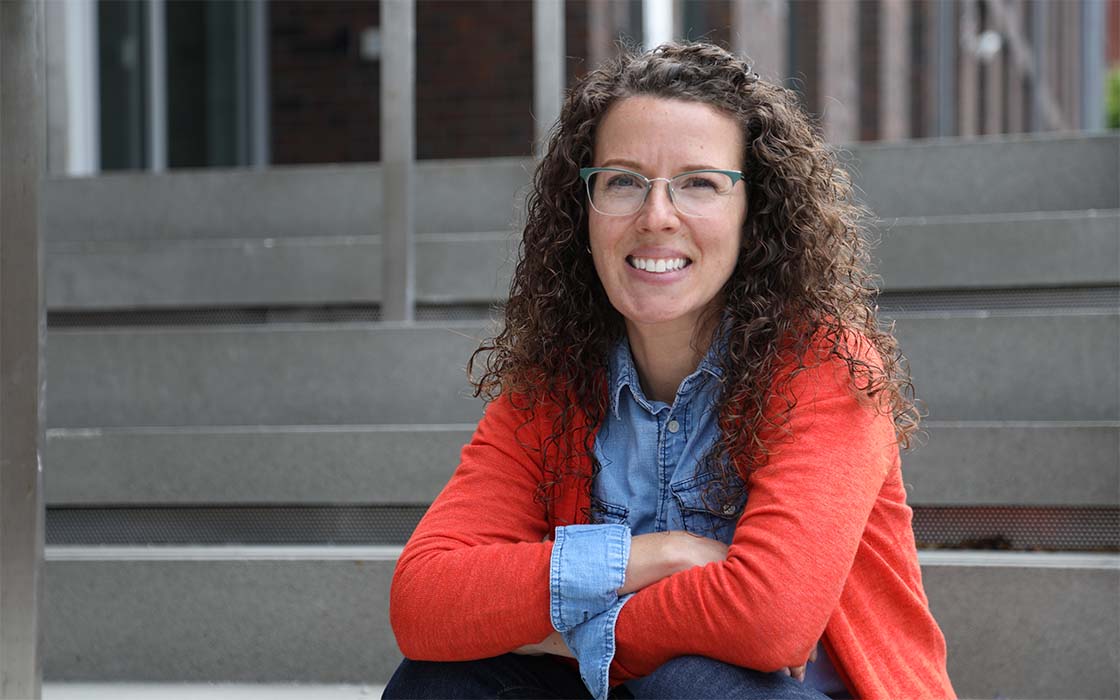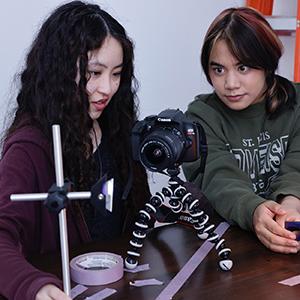
Dani Small: The Barrier Breaker
First-gen alumna Dani Small, ’23, Master of Social Work, wants to bring the values she defined through both her undergrad and grad experiences at UW Tacoma into the corporate world.
Dani Small has an on-again/off-again connection to UW Tacoma. Small earned her bachelor’s degree in interdisciplinary studies back in 2007. “The major provided me with flexibility and exposure to multiple interests,” she said. “Looking back now at the classes I took, a majority of them aligned to a social justice theme.” It’s that theme that led her back to the campus to pursue a master’s in social work.
Small and her husband Adam have alternated attendance at UW Tacoma, a place she says feels like home, since they moved to the area from Buffalo, N.Y. in 2006. “I did my undergrad here,” she said. “After I finished up, he did his MBA here,” Small said. “Then a few years later, here I'm back with my MSW. We've always had a connection one way or another really since we moved here. We bleed purple.”
Small went to work for Goodwill Industries in Tacoma following the completion of her undergraduate degree. “I ran a financial literacy program,” she said. “I was working one-on-one with families and individuals, but I was also operating and managing a thriving program. On top of that I did advocacy work at a statewide level. Thinking back, I would really like to do something similar within an organization that allows me to make a meaningful impact at all three levels, because I really enjoyed that work.”
During her time at Goodwill, Small helped triple the number of graduates from the company’s financial literacy program, created community partnerships and grew the program outside of Pierce County, all the while sitting on then-Governor Christine Gregoire’s financial literacy taskforce. “I felt like I was making a difference,” she said. “At the same time, I felt like that was just the beginning for me.” Those experiences led her back to UW Tacoma.
Getting her master’s in social work got Small thinking about her children, her own childhood, and the importance of education. “I’m a mother of two elementary-aged children and it was depleting at times to do my coursework while raising a family in the midst of a global pandemic and the social justice movement that came to the forefront following the murder of George Floyd,” she said. Small said she took comfort from a quote by the young poet Amanda Gorman. Gorman read the following at President Joe Biden’s inauguration in 2021: "We cannot fight for others when we are fighting a war inside ourselves. Compassion is reflexive, a power that we first bestow on ourselves and then give away through our actions to people and to the planet." For Small, the quote was instructive and impactful. “What I'm modeling for my children has really been my driving force to persevere,” she said.
Small did her MSW practicum with the Milgard School of Business with both the Center for Leadership and Social Responsibility (CLSR) and the Milgard Women’s Initiative (MWI). Between that and her work with Goodwill, she developed a core set of values she wants to bring to the corporate workplace. “I've gotten so many funny faces when I share that my social work practicum is within the business school,” she said. “But my practicum experience with CLSR and MWI has really encouraged me to think big and reflect on how the transferrable skills and the values of social work can help companies do more impactful work to address social challenges and develop socially responsible leaders.”
Those challenges for Small include things like employee health and well-being, community relations, diversity, equity and inclusion, and community impact. “I'm intrigued by the idea of social work within more non-traditional settings, such as business and the private sector,” Small said. “I think that women in general are placing a higher premium on organizations that have the right work culture and prioritize diversity, equity and inclusion. It's important to me that I land with an organization that promotes these values and not just in a transactional, check-the-box way.”
Like others who navigated a degree in the past few years, Small said the disruptions of switching modalities added to her feeling of accomplishment. “My husband asks on a regular basis, ‘What's your next master's degree in?’” she said. “I look at him and say, ‘Okay, you're up next.’ He says, ‘Nope, I'm done. What's your next master's degree in?’”
Right now, Small is focused on celebrating her accomplishment, and going out into the corporate world. “I got through with a 3.9 grade point average,” she said. “I’ve got a lot of reasons to be proud of myself. I am a first-generation college student, I am a cycle-breaker. From this point forward, I dedicate the rest of my life to being a barrier-breaker for others.”



